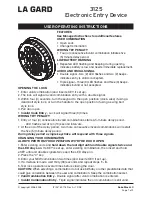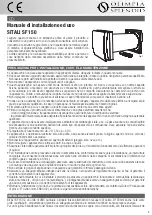
25
PF
-
3 PREFILTERS–
ShurFlo
An Aquifer system uses a single 5 micron filter to clean the feed water of abrasive materials
while the system is in operation. A carbon filter may be used to prevent the entrance of chlo-
rine during fresh water flushing.
During normal operation, the feed water is filtered in two stages. First it passes through a fine
mesh metal sea strainer, which protects the Feed Pump from foreign materials and larger sea
creatures. After passing through the Feed Pump, the feed water passes the filter housing con-
taining 5 micron element, removing very fine particles that could damage the Clark Pump and
shorten membrane life.
Cleaning schedules will vary widely depending on how and where the system is used. If large
amounts of feed water are run through the system over a relatively short period of time in bi-
ologically fertile near
-
shore waters, the prefilters will plug up, water production and quality
will drop, and the system pressure will change dramatically. If the pressure gauge was installed
before the prefilters, as pictured in this manual, the pressure will increase. If the pressure
gauge was installed after the prefilters the pressure will drop
When operated for only an hour or two a day in inland or near
-
shore waters, the trapped
plankton will begin to decay in the filters long before the elements plug up. The decaying
plankton and bacteria will cause a
“
rotten egg
”
smell in the product water. This decay will set
in overnight in tropical waters, or after a week or two in higher latitudes. If handled gently and
changed regularly before they get too smelly, filters can be cleaned several times.
In crystal clear blue water conditions, the filters may need to be cleaned much less frequently.
If a charcoal filter is used for fresh water flushing the system it will not plug up unless you have
some incredibly dirty domestic water in your supply tank. About six months after installation
the charcoal filter element will lose its effectiveness and must be replaced. This is purely a
function of time.













































